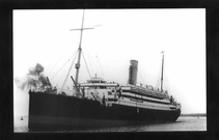Science News
Citizen Science Goes to Sea

The Royal Navy was taught to be very thorough during World War I. At sea, despite battles and storms, they recorded the weather every four hours dutifully into logbooks. Good thing, too. Little did those sailors realize that 100 years later, those books would be digitized (huh?) and distributed on the internet (the what?) for citizen scientists to record for a noble purpose.
Universe Today puts it this way:
The project is designed to provide a detailed map of the world’s climate around 100 years ago, which will help tell us more about the climate today. Anyone can take part, read the logs, follow events aboard the vessels and contribute to this fun and historical project, which could tell us more about our climate’s future.
How can old data help us see into the future? We asked Academy researcher Peter Roopnarine.
One method of verification is to apply the models to reconstructions of past climate. That only works, of course, if we have actual climate measures of the past. We've kept pretty good instrument measures for almost 200 years for various parts of the globe, and excellent records for the past 100 years. But most of those records are land-based, and the models utilize both land and sea-based parameters. So this project is searching for sea-based data, using nautical logs from the Royal Navy.
An article in Wired confirms this:
Climate scientists can feed hundreds of individual observations of the weather, temperature and air pressure into atmosphere models to build weather maps of the entire globe. Data on the ocean, which is a good store of heat, can provide information on what was happening on land as well.
It sounds like a fun way to relive history and help climate scientists at the same time. And the effort is fun and easy, too. There’s a great video showing you how to get started and the process includes maps and old images to help put you onboard.
The project is called Old Weather and is part of the Zooniverse community that allows “327,211 people just like you,” (as their website claims) to contribute to real science. Bon Voyage!